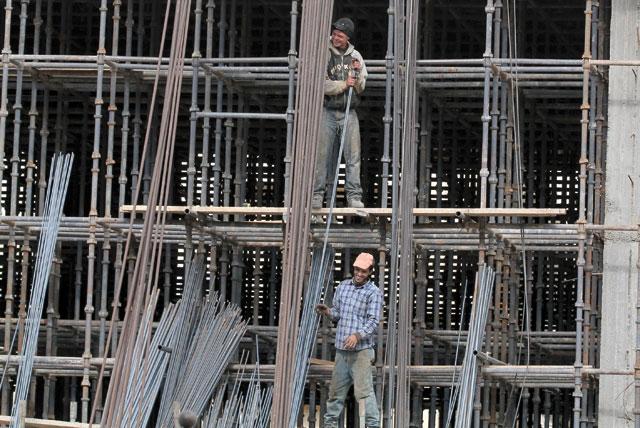You are here
Rights groups concerned kafalah system might ‘open door to forced labour’
By Ana V. Ibáñez Prieto - Oct 11,2018 - Last updated at Oct 11,2018
AMMAN — Several labour rights organisations have recently voiced their concerns over the application of the kafalah (sponsorship) system on the issuance of work permits for migrant workers in the Kingdom.
According to the International Labour Organisation’s (ILO) media-friendly glossary, the kafalah system is used as a means to regulate migrant labour in several Arab countries, including Jordan.
Under the system, a migrant worker’s immigration and legal residency status is tied to an individual sponsor (kafeel) through a contract period during which workers cannot resign from their jobs, transfer employment or leave the country without first obtaining written permission from their employers.
“In most cases, violations to the rights of migrant workers are related to the sponsorship system, as it gives employers the authority to keep them even if they wish to transfer to another employer,” director of the migrant rights group, Tamkeen Fields for Aid, Linda Al Kalash said in a statement sent to The Jordan Times.
Because of this, “the system allows for the exploitation and violation of the rights of large numbers of migrant workers in Jordan”, Director of Jordan Labour Watch Ahmad Awad charged, warning that “the sponsorship system opens the door to forced labour”.
In June this year, the US State Department’s Trafficking in Persons Report classified Jordan as a Tier 2 in relation to its efforts on combating human trafficking, listing the sponsorship system as one of the challenges yet to be addressed.
“Despite the government’s victim identification and protection efforts, some foreign trafficking victims remained vulnerable to financial penalties, arrest, detention and deportation if found without valid residency documents,” the report said, noting that “Jordan’s sponsorship system prevents foreign workers from switching employers without a letter of release from their sponsor and from receiving adequate access to legal recourse in response to abuse”.
“When I came to Jordan, I worked in the agricultural sector because it was much easier to get a permit there and it had lower fees. I stayed a whole year working for the same employer, and when my permit expired, I asked him to renew it but he refused. So I had to leave and began working in a barber shop irregularly as I used to work in this sector back in Egypt,” a worker in a barbershop in Karak told Tamkeen. The worker recalled how when his new employer tried to issue a work permit, the Labour Directorate asked for a clearance from his old sponsor, who demanded a fee of JD500 in return for the clearance.
“I eventually ended up paying despite knowing that he was exploiting me, because I had to get the paper to issue my work permit,” the worker said.
Workers in the textile sector in Aqaba added: “No worker is allowed to move to another employer under any circumstances — We do not have the freedom to move to work in another factory and we are prevented from doing so, as the owner of the factory threatens to deport us if we request it.”
The US State Department’s report also noted that “forced labour victims in Jordan experience withheld or non-payment of wages, confiscation of identity documents, restricted freedom of movement, unsafe living conditions, long hours without rest, isolation, and verbal and physical abuse.”
The report added that “migrant workers, including potential trafficking victims who left their place of employment prior to fulfilling their work contract, were considered illegal residents and accrued fines for their illegal presence in the country and risked detention”.
Commenting on the report, Government Coordinator for Human Rights Basil Tarawneh said the government had adopted a special system in dealing with such local, regional and international reports.
“The government’s human rights committee is tasked with studying and analysing the content of such reports to eventually refer observations to the concerned authorities for implementation and follow up,” Tarawneh told The Jordan Times in July, adding that the Public Security Department (PSD) has a special unit for following-up on human trafficking violations.
“We have conducted 100 trainings and lectures with the PSD, labour ministry workers and relevant local organisations offering help to the victims,” Tarawneh explained, noting that since the beginning of this year until the end of June, “the concerned authorities conducted several raids on establishments where they recorded 147 violations”.
Labour Ministry spokesperson Mohammad Al Khatib, clarified that no references to the sponsorship system exist in the Jordanian legislation, noting that work permits linking migrant workers to their employers are issued in order to regulate the labour market, and to enable migrant workers to work for an employer under the provisions of the Labour Law.
“The work permits are bound by a fixed-term contract that requires the consent of both parties upon termination,” the official explained, stressing that “the relationship between migrant workers and their employers is governed by the Labour Law, which complies with the international labour standards”.
Concerning violations, Khatib noted that “both national and foreign workers are entitled to claim their rights through the inspection apparatus of the ministry, the Wages Authority or competent courts”.
Jordan’s legal protection for migrant workers has been considered better than that of many other countries across the Arab region by a previous policy brief issued by the ILO, which highlighted that the Kingdom included domestic workers under the Labour Law in 2008, and passed a law against human trafficking and forced labour in 2009.
Furthermore, in November 2017, the Ministry of Labour introduced a new package of exceptions targeted at Syrian refugees, which included the issuance of flexible work permits for specific sectors, the permission to switch sectors without a clearance form when a permit had expired and the ability to switch employers without a release form.
“But while Jordan is maybe the best in the region when it comes to legislation, the situation in practice remains almost the same as in other countries, with no freedom of movement for migrant workers,” Kalash added.
“For several years, human rights activists and civil society organisations have stressed the need to end this system and start developing open labour contracts in Jordan,” Awad said, adding that “such an alternative policy would not adversely affect employers or harm the balance of labour relations between Jordanian migrant workers”.
“Indeed, it would encourage hundreds of thousands of migrant workers to obtain work permits and contribute to the protection of their rights while walking out of the informal labour market,” Awad concluded.
ILO Regional Resilience and Crisis Response specialist Maha Kattaa told The Jordan Times that the UN agency is “advocating for a flexible scheme to be expanded to other sectors, in addition to opening the door to inter-sectorial work permits for refugees”.
“This would put less of a burden on refugees, as they would not be tied to a single employer or have to issue a new permit each time they wish to move to another employer,” she added, noting that inter-sectorial work permits would also reduce administrative work within governmental entities.
Related Articles
AMMAN — Over 16,000 flexible working permits for Syrian refugees employed in the construction sector have been issued over the past year, th
AMMAN — The NGO, Care International, on Sunday launched its “Work Permits Protect Your Rights” campaign, aimed at raising awareness among Sy
AMMAN — Guest workers will not be able to change their workplace before their work permits expire under new regulations issued by the Labour

















